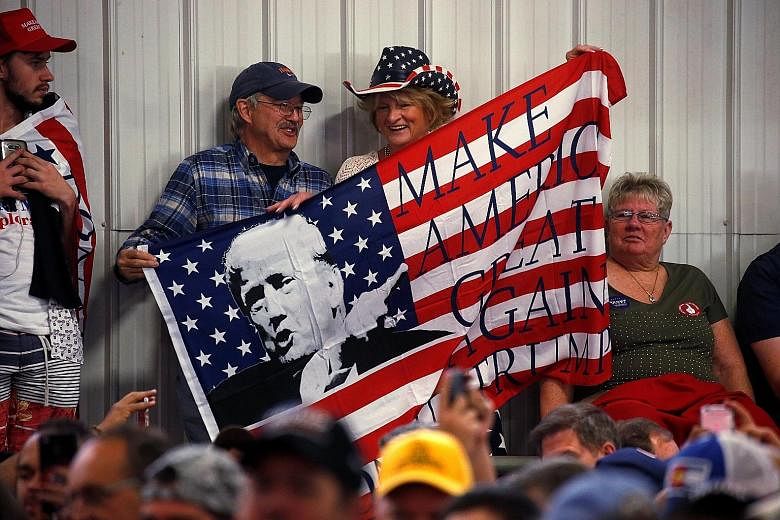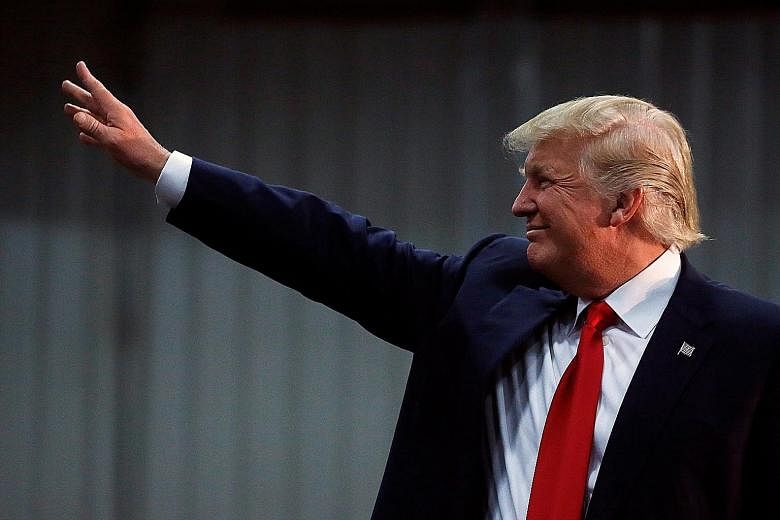After its nominee Mitt Romney lost to President Barack Obama in the 2012 presidential election, the Republican Party released a bold post- mortem on what it needed to do to stay relevant.
The Growth and Opportunity Project report made a number of blunt recommendations for the party, also known as the GOP (Grand Old Party), including endorsing comprehensive immigration reform and a more accepting attitude on social issues like gay rights.
On immigration, for instance, the report wrote: "If Hispanic Americans hear that the GOP doesn't want them in the United States, they won't pay attention to our next sentence. It doesn't matter what we say about education, jobs or the economy; if Hispanics think we do not want them here, they will close their ears to our policies."
That the party today - in picking Mr Donald Trump as its flag bearer - seems to have completely repudiated that report is a sign of the tough balancing act it faces.
According to surveys by the Pew Research Centre, the Republican Party of today is less diverse, older, and more religious than the Democratic Party.
Non-Hispanic whites form 86 per cent of Republicans compared with just 57 per cent of Democrats. And while 51 per cent of Democrats are under 50 years old, only 41 per cent of Republicans are.
So, even as it tries to woo younger, more diverse members, it finds itself struggling to continue to properly represent the disparate ideologies of its many existing factions.
The ideological soup is complicated further by an unconventional presidential nominee with positions that fly in the face of long- held party orthodoxies.
A look at four demographic profiles of Republicans - white working-class voters, fiscal conservatives, religious conservatives and veterans - throws up little common ideology binding them together.
The white working-class voters who form the most motivated core of the Trump support base appear to disagree with the more traditional pro free-trade, pro-small government faction of fiscal conservatives.
People like Iowa farmer Floyd Kibbe, 49, believe free trade hurts the country and also think that the government is doing too much for foreigners and not enough for its own citizens.
"I think Trump knows business and he can set things right," he said.
However, a desire for the government to do more for its own citizens flies in the face of long-held beliefs among the likes of libertarians and fiscal conservatives that the government needs to govern as little as possible.
Insurance agent Patrick Casale, for instance, wants nothing more than for the government to get out of his hair.
"They don't want to listen to you in Washington. Not one politician in Washington understands the insurance law; they're ignorant," the 55-year-old said, adding that government regulation has hurt his business.
Then there are the religious conservatives largely centred on the Bible Belt across the south-east who vote primarily on issues like restrictions on abortion and gay marriage.
These Republicans do not always agree with Mr Trump's actions or words but are voting for him anyway because they want to ensure social conservatives are appointed to the Supreme Court.
But these hard lines on social issues, as noted in the 2012 post-mortem, turn off millennial voters who might otherwise be swayed by the Republican Party's economic message. Recent polls show that if only millennials voted, Mr Trump could be assured of winning only five of the 50 states.
Among military veterans, allegiances appear to be shifting too. Veterans have long been a core constituency for the GOP for a complex set of reasons, including the party's perceived reputation as being pro- military and the fact that veterans are overwhelmingly white males, but the Democrats are making a serious play for the group this year.
An NBC/SurveyMonkey poll shows Mr Trump getting 55 per cent of military votes compared with 36 per cent for Mrs Hillary Clinton. Yet, nearly half of the veterans say they do not trust his ability as commander-in-chief.
Analysts and Republicans alike agree the party needs to transform itself if it is to remain competitive in presidential elections. Though it can continue to rely on social and fiscal conservatives as well as white working-class voters, those groups may not be enough to win the White House in the future.
The process of reform is one the party of Abraham Lincoln has gone through many times before, but how that happens today depends on the outcome of the election.
With Mr Trump as president or as a continuing influential force, the party will likely take a very different path from the one set out in 2012.
At least one young Republican - university student Frank Carrasco, 31, from Florida - thinks the party needs a drastic change of course after the election.
He said: "As much as it pains me to say this about the GOP, I almost hope Hillary wins all 50 states in a blow-out election, if only to serve as a rebuke to the party and maybe eradicate any notion that the likes of Trump were ever legitimate."


